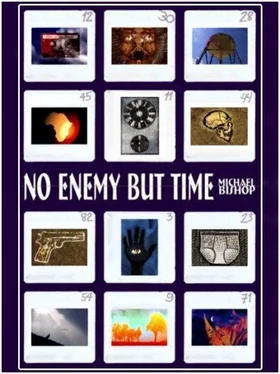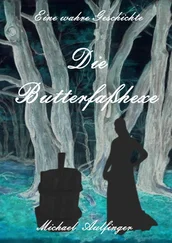Alfie, I saw, was pleased. So were the other Minids. Involuntarily, the corners of their lips had lifted into placatory smiles. Alfie was thumping the end of his stave against the ground as if applauding the leopard’s arrival. Dear Ngai, I thought, they want their comrade’s corpse to be eaten by this creature. And indeed they did. We watched the big cat tear away a portion of the dead man’s flank and bolt this down as a hungry dog gobbles down a can of Alpo. It now occurred to me that the women had anointed Genly’s body with the juice of ol duvai to inure it to the brutal depredations of the leopard. Further, by sacrificing his corpse to this handsome animal, the Minids denied it to the vultures and the hyenas. Hence the pleasure they took in what was for me a grisly interlude in the funeral ceremony.
Finally, knowing that Genly was “safe,” we returned to the Minid citadel. I dragged the travois behind me, feeling the kind of cosmic estrangement that used to succeed my childhood spirit-traveling episodes.
No one had eaten that day, and no one would eat again until the next. This fast was yet another element in the habilines’ communal reaction to death, but my discovery of these various elements—ones that many contemporary paleoanthropologists have either dismissed as nonsense or hedged about with qualifiers—gave me no sense of accomplishment, no exhilarating shot in the arm. The series of rituals that allowed the Minids to come to terms with Genly’s passing induced in me a profound shock. From the total sum of deaths suffered by human beings since the beginning of our species, I reflected, we had no right to subtract those of Homo neanderthalus, Homo erectus, or Homo habilis . How many more collateral species should we add? Was there, in fact, any legitimate cut-off point?
How strange to think that a creature dead these two million years had fears and aspirations akin to my own. Akin —a very appropriate word.
* * *
Back in New Helensburgh I set myself a task of penance and atonement. I gathered saplings, dry grass, and stones with which to build a hut to replace the one I had destroyed by fire. In fact, I accumulated and laid by enough materials to construct a second hut for myself. My preparatory labor kept me toiling up and down the slopes of the hill until evening, when I began the actual work on the huts themselves.
Quickly and surely I erected the wall and ceiling supports, then covered them with a much thicker weave of dry grasses than the Minids usually employed. This enterprise, which surprised and fascinated the habilines, kept my mind off Genly’s death—without, however, dispelling my nagging subliminal awareness of it—and I began to cherish the idea of retiring to the warm, dry interior of my hut for a long nap. I wanted privacy, but I did not want to abandon New Helensburgh to acquire it. By moonrise I had finished both structures, and I crept into mine like a creature intent on plunging itself into the oblivion of a hard, hibernal sleep.
I could not sleep. Genly had died because of my carelessness, and the anarchic gaiety of the previous evening arose in my memory to taunt me by way of contrast. From blithe giddiness to black despair in less than twenty-four hours. The Stone Age, it seemed to me, had an adamantine heart. Outside, the Minids were softly singing their loss, each dirge creating its own context of grief, eight or nine separate voices with nothing in common but an otherwise inexpressible melancholy. Like Ham’s song that afternoon, this phenomenon had no precedent in my experience among the protohumans, and I felt even more a disruptive force, an intruder.
A silhouette suddenly appeared in my low doorway. It was Helen, her flyaway hair a halo against the lingering crimson of the sunset. I had not seen her since that morning. She was no respecter of thresholds, and mine was probably too new to merit any special consideration as a threshold. What was mine was willy-nilly hers, apparently, and she seemed to have concluded that this new hut could easily accommodate both of us. She squeezed inside, walked to me on all fours, and touched my forehead like a confessor bestowing absolution on a penitent.
Something cold and hard fell against my knee. I reached down, picked it up, and realized that it was my Colt automatic. Slyly canting her head, Helen leaned back and studied my face. Her eyes were smoky marbles in a bust of discolored lapis lazuli, and I regarded her at that moment as an angel of transcendent apehood, a woman well ahead of her time.
“You’re liable to need that,” she said.
Of course she had said nothing at all, but in my despair I half believed that she had spoken, and I felt with absolute certainty that all I needed to survive this out-of-sequence period of my life was Helen herself. To that end, reading my thoughts, she had come to me of her own accord.
Eglin Air Force Base, Florida
Spring 1976
OnFriday afternoon Hugo came into his family’s Capehart housing unit and found John-John sprawled across a chair reading an omnibus volume of John Collier short stories. The boy acknowledged him with a nod but went quickly back to his book. Nobody else was at home.
Anna was attending Agnes Scott College in Atlanta, and Jeannette, since mid-April, had been living on Long Island with the family of her editor at the Vireo Press. She was doing full-scale revisions on a manuscript that had been assembled in February, a collection of semiserious book columns she had written for the Herald-Plainsman and then for a small syndicate with outlets in both the Sunbelt and the Rocky Mountain region. Her purpose now was to polish, update, and citify these columns so that they would appeal to Eastern urbanites as well as the easygoing, down-home sophisticates who had comprised their first audience. Hugo had wanted Jeannette to do this work at home, but when her editor invited her to New York for consultations on the necessary changes, he had not been able to bring himself to forbid the trip. Anyway, he had never had that kind of power.
“Come on Johnny, let’s take a little vacation this weekend. You up to goin’ for a ride?”
“A vacation? Where?”
“Through the pine woods of northern Flo- REE-dah. Maybe over to Silver Springs, too. We’ll go for a cruise on a glass-bottom boat and watch the pretty mermaids in the ballet.”
John put down his book and grimaced.
“We’re goin’, hijo mío . I’m tired of all this jackass creative bachin’ we been doin’ and ready for somethin’ new, okay?” Supper, if he bothered to fix it, would be either hot dogs or frozen TV dinners.
“Go pack some stuff, Johnny. Twenty minutes, okay?”
The boy grudgingly obeyed. Hugo, in his own room, threw several items into an overnight bag and changed into sports clothes. He found the meerschaum pipe that Pete Grier, four years ago, had given him as a going-away present just prior to his departure for an unaccompanied tour of duty on Guam.
That tour, with Jeannette and the kids remaining in Cheyenne, had marked a critical watershed in the Monegals’ married life, their first protracted separation. There were lots of bad memories about his part in the bombardment of Cambodia, too, including playing father confessor to a young navigator who had accidentally obliterated a friendly village by failing to throw a switch locked on the village’s targeting beacon. The kid’s B-52 had “boxed” the place with bombs…. It was a good pipe, though, well broken-in and comforting.
* * *
An hour away from Eglin, driving east, they saw the first of the garish billboards advertising Ritki’s Gift & Souvenir Emporium. The signs were spaced at mile intervals, amid the exotic vegetable architecture of kudzu, and each one promised the out-of-state vacationer a variety of marvels. Papaya juice. Porcelain figurines. Fudge divinity. And a free “animal ranch.”
Читать дальше



![Ally Carter - [Gallagher Girls 01] I'd Tell You I Love You But Then I'd Have to Kill You](/books/262179/ally-carter-gallagher-girls-01-i-d-tell-you-i-lo-thumb.webp)








